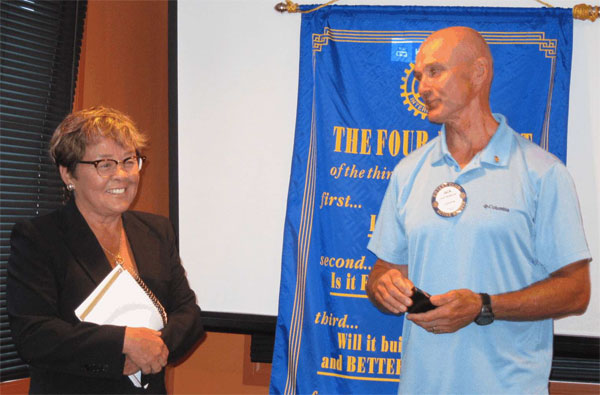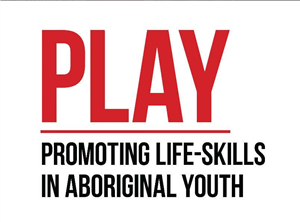Right to Play and Promoting Life-skills for Aboriginal Youth (PLAY) Programmes
Posted by John Borst
on Jul 29, 2015
Sheryl Hoshizaki, a retired educator having been a teacher and principal also served as President of the Women Teachers Federation of Ontario. Once in their younger days, she even threw our President, Jack McMaster over the judo floor.
After retirement from education, Hoshizaki joined Right To Play, where she served as Deputy Director of Educational and Aboriginal Initiatives.

Sheryl Hoshizaki and President Jack McMaster
Sheryl described the origins of this Canadian based international non-profit organization.
It was only a few months before the 1994 Lillehammer Winter Olympics, when Norwegian speed skater Johann Olav Koss led a humanitarian trip to the newly formed African country of Eritrea. As an ambassador of the organization Olympic Aid (which became Right To Play), the athlete came face-to-face with the realities of life in a country emerging from decades of war. As children played amidst burned out tanks, surrounded by the images of war martyrs, one boy stood out and crystallized an idea for Johann that would write the future of Right to Play:
"I met a group of boys, and one of them was very popular," says Johann. "I asked him why and he said 'can't you see? I have long sleeves'." The boy then took off his shirt, rolled it up and used the sleeves to tie the shirt up into a ball that the kids used to play. The game ended when it was time for the boy with the long sleeves to go home.
The following February, Johann skated in the 1994 Lillehammer Winter Olympics, and made history by breaking three world records and winning three gold medals in the men's 1,500m, 5,000m and 10,000m speed skating events. Remembering the boys in Eritrea, he pledged his gold medal bonus to Olympic Aid and asked his fellow Norwegians to donate a few dollars for every gold medal won by Norway at the games.
They won 26 medals. A few days later, he had raised more than $18 million. Johann returned to Eritrea with a proper ball for the boy in the long sleeves and his friends. He also brought an airplane full of sports equipment to a country in dire need of food and basic necessities.
They use the power of play to educate and empower children to be guardians of their own health and active participants in their communities.
The programs create positive experiences and teach important life skills that encourage behavior change. At the core of every activity is the Reflect-Connect-Apply approach, which encourages children to examine their experiences, relate those experiences to what they already know and apply that learning to their daily lives. This strategy helps children adopt and maintain lifelong healthy behaviours and attitudes.

In 2010, Sheryl initiated a program with aboriginal children and youth in Moose Creek and Sandy Lake First Nations to receive hockey lessons and compete in hockey games. She was assisted by former NHL player John Chabot , who is of First Nations ancestry.
Promoting Life-skills for Aboriginal Youth (PLAY) is a pilot program developed by Right To Play in partnership with the Province of Ontario and other organizations. The program helps Aboriginal youth improve their health, self-esteem and leadership skills through participation in sport and play activities.
The winter hockey camps are the latest addition to the PLAY program. They build on the success of the summer program, which helped Aboriginal children and youth learn valuable life-skills and improve their health.
Since 2010, PLAY has expanded from two to 56 First Nation and urban Aboriginal communities in Ontario and Manitoba, engaging over 5,000 children and youth.
Based on Right To Play programming in more than 20 countries around the world, PLAY uses sport and play to support Aboriginal youth and help them develop valuable life skills and improve their health. A key component of the program is building leadership through volunteer work and relationship building with other members of the community.
PLAY supports and trains local Community Mentors to facilitate weekly programs that empower children and youth to enhance their leadership skills, become more civically engaged, increase their motivation to set and reach positive life goals, and enhance their self-esteem and self-efficacy.
To learn more about Right To Play and PLAY visit these sites:
Videos
The Mission of Right To Play https://youtu.be/78F6kRbV5nM
The power of play: Johann Koss at TEDxLakeGeneva https://youtu.be/MNr5NLvthRA
